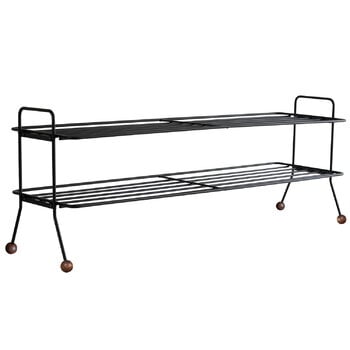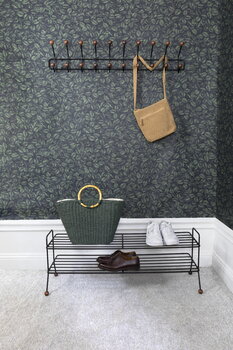The Bill shoe shelf, designed by Louise Hederström for the Swedish Maze, is part of a collection of modern storage furniture characterised by a minimalist appearance that easily suits any hallway. The geometrical design of the Bill shoe rack is a combination of a recycled metal frame and playful hooks perfected with round, wooden balls. Complement the storage style with other products from Maze’s Bill collection.
Bill shoe shelf, L, black - walnut stained ash
Maze
Description
The Bill shoe shelf, designed by Louise Hederström for the Swedish Maze, is part of a collection of modern storage furniture characterised by a minimalist appearance that easily suits any hallway. The geometrical design of the Bill shoe rack is a combination of a recycled metal frame and playful hooks perfected with round, wooden balls. Complement the storage style with other products from Maze’s Bill collection.
Product details (7)
- Material
- Powder coated metal, walnut stained ash
- Colour
- Black, brown
- Width
- 104.2 cm
- Depth
- 30 cm
- Height
- 39 cm
- Weight
- 5 kg
- Notes
- Requires assembly.
- Product ID
Designer
The Swedish designer Louise Hederström lives and works in Malmö, Sweden. She has studied at Beckmans in Stockholm as well as at the University of Lund. She has managed her own studio, Charming Unit Design Studio, for several year. She has also worked at IKEA and her work has been shown in many international exhibitions. Hederström gets inspired by animals, colors, decorations and last but not least by Elvis Presley.
View all productsReviews (1)
4
Based on 1 reviews
-
S
Sari V
Salo, Finland
Siisti, riittävän tukeva kuitenkin kevyen näköinen.
389 days ago
Sustainability
The Product Sustainability Framework, our criteria of sustainable design, helps you find the most sustainable products in our selection. Read below which sustainability criteria this product has met.
Working conditions & labour 6/9
-
Equal opportunities for all employees
-
Commitment to UN Global Compact, fair compensation for all employees
-
Corporate responsibility requirements defined and communicated for suppliers
-
Systematic work for improved inclusion and well-being in the workplace
-
Transparent supply chain
-
Suppliers' compliance to a code of conduct ensured
-
Direct suppliers audited and certified
-
Compliance to the UN Guiding Principles on Business and Human Rights ensured in the supply chain
-
Support for community involvement in the supply chain
Eco-friendly production 7/9
-
Fair and resource-wise water-use in production
-
No incineration or landfilling of returned items
-
No use of endangered species as materials
-
No direct environmental emissions or waste (excl. GHGs) from production
-
The sustainability of direct suppliers' production is addressed and monitored
-
Material-efficient and ecological packaging
-
No potentially harmful chemicals used in own production
-
Production and material sourcing that respect biodiversity, animal rights, and natural ecosystems
-
Positive impact on nature’s well-being through operations that regenerate natural ecosystems
Climate impact 3/8
-
Company's direct greenhouse gas emissions identified and commitment to reduction
-
Product's carbon impact identified and commitment to reduction
-
Guidance on energy- and eco-efficient use of the product
-
Contribution to climate initiatives beyond the brand’s direct operations
-
Low-carbon or compensated transportation
-
Carbon footprint of the product calculated and goals set to reduce it
-
100 % renewable energy in own production and operations
-
Carbon neutral or carbon negative product
Sustainable materials 5/6
-
Sustainable and long-lasting material choices
-
No harmful or hazardous substances
-
Responsible raw material sourcing and production
-
Materials suited for circularity: monomaterials, recyclable finishings, renewable or recycled contents etc.
-
Ecological materials: natural, biodegradable, recyclable or recycled contents
-
Outstanding materials in terms of innovativeness, responsibility, sustainability and circularity: local production or sourcing, 100 % recycled content, C2C-certification etc.
Circular design 4/5
-
High aesthetic quality promoting long-term use of the product
-
Technically durable product design and material choices
-
Design for enduring life-long quality
-
Design and support for product maintenance, repair and upgradability
-
Innovative circular design solutions: circular service system, resale platform, remanufacturing, collection of used products, etc.







